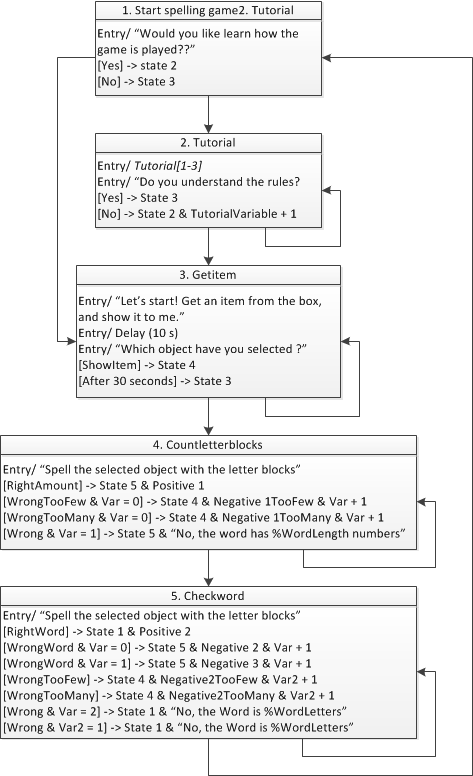0LAUK0 PRE2016 3 Groep18 Spellinggame: Difference between revisions
No edit summary |
|||
| Line 23: | Line 23: | ||
'''Tutorial''' | '''Tutorial''' | ||
*Het spel is simpel. Jij pakt eerst een voorwerp uit de doos en laat het aan mij zien. Daarna moet jij met de letterblokken het woord van het voorwerp proberen te spellen. | |||
*Als eerste kies jij een voorwerp uit de doos. Daarna laat je dat voorwerp aan mij zien. Als laatste probeer jij het woord van het voorwerp te spellen met de letterblokken. | |||
'''Do you understand the rules?''' | '''Do you understand the rules?''' | ||
Revision as of 19:15, 11 April 2017
Spelling
Explanation
The child picks an object from a box of predefined objects and miniature items. The child can, for example, pick an tractor or a stuffed monkey. The robot, using an image recognition algorithm, will recognize the object presented by the child. The robot will then ask the child to spell the word the item represents. Spelling is not done by writing or speaking out loud, but by using letter blocks. These are blocks with on every side a letter.
This game is a much more fun and interactive way to learn to spell than a teacher who dictates the words. Not only can the child use real life objects and items, he will also play with the letter blocks to spell the correct word. When the word is not correctly spelled by the child, the robot will give hints to child such that the child will be able to correct his mistakes. Using this constructive feedback, the child will feel less negative than when just plainly saying he did it wrong.
Actions
- Start: in the beginning the robot sits down, when a child is aproaching to the robot, the robot stays up and waves, this action is used at the start.
- End: In the end the robot is standing, when the child is done playing games the robot waves and will sit down, this action is at the end of multiple games.
- Positive: The robot's eyes will turn green and the robot will give a thumbs up, this is a gesture when the word is correctly spelled.
- Negative: The robot will move his head to the left and right. This is a gesture which is used for when the child spelled the word incorrectly.
Strings
Summing up strings for the diagram below.
Would you like to learn how the game is played?
- Zal ik de regels van het spel uitleggen?
- Wil je weten hoe het spel gespeeld moet worden?
- Wil je weten hoe het spel gaat?
- Wil je de regels van het spel weten?
- Zal ik het spel uitleggen?
Tutorial
- Het spel is simpel. Jij pakt eerst een voorwerp uit de doos en laat het aan mij zien. Daarna moet jij met de letterblokken het woord van het voorwerp proberen te spellen.
- Als eerste kies jij een voorwerp uit de doos. Daarna laat je dat voorwerp aan mij zien. Als laatste probeer jij het woord van het voorwerp te spellen met de letterblokken.
Do you understand the rules?
- Snap je de regels van het spel?
- Snap je het?
- Heb je het allemaal begrepen?
- Weet je hoe het spel gaat?
Let's start! Get an item from the box and show it to me.
- Laten we beginnen! Pak een voorwerp uit de doos en laat het aan mij zien.
- Kom op, dan gaan we beginnen! Kies een voorwerp uit de doos en laat het daarna aan mij zien.
Which object have you selected?
- Laat nu je gekozen voorwerp aan mij zien.
- Laat nu het voorwerp dat je gepakt hebt aan mij zien.
Spell the selected object with the letter blocks
- Gebruik nu de letterblokken om het woord van het voorwerp te spellen.
- Spel nu het woord van het object met de letterblokken.
No, the word has %WordLength letters
- Nee, het woord heeft %WordLength letters.
- Je moet %WordLength letters gebruiken om het woord te spellen.
Negative
- 1: Helaas, maar dat is niet goed.
- 2: Jammer, maar dat is niet helemaal goed.
- 3: Dat klopt helaas niet.
Positive
- 1: Goed gedaan!
- 2: Goed zo!
- 3: Super!
- 4: Top!
- 5: Hartstikke goed!
- 6: Heel goed!
